9 Practical Design Tips for a Walk In Wardrobe That Stays Organised
July 11, 2025
Imagine stepping into your very own luxury boutique every morning right in your home. Whether you’re managing a pared-back capsule wardrobe or a sprawling designer collection, the secret lies in tailoring your layout to your lifestyle and keeping every piece on display and within easy reach. Good thing, experts at Silva Wardrobe know how vital it is to balance elegant design with smart storage.
In the next nine tips, you’ll discover how to carve out dedicated zones for shoes and accessories, mix open shelving with concealed drawers to control visual clutter, and squeeze every centimetre of vertical space for boots and handbags. Let's get started!
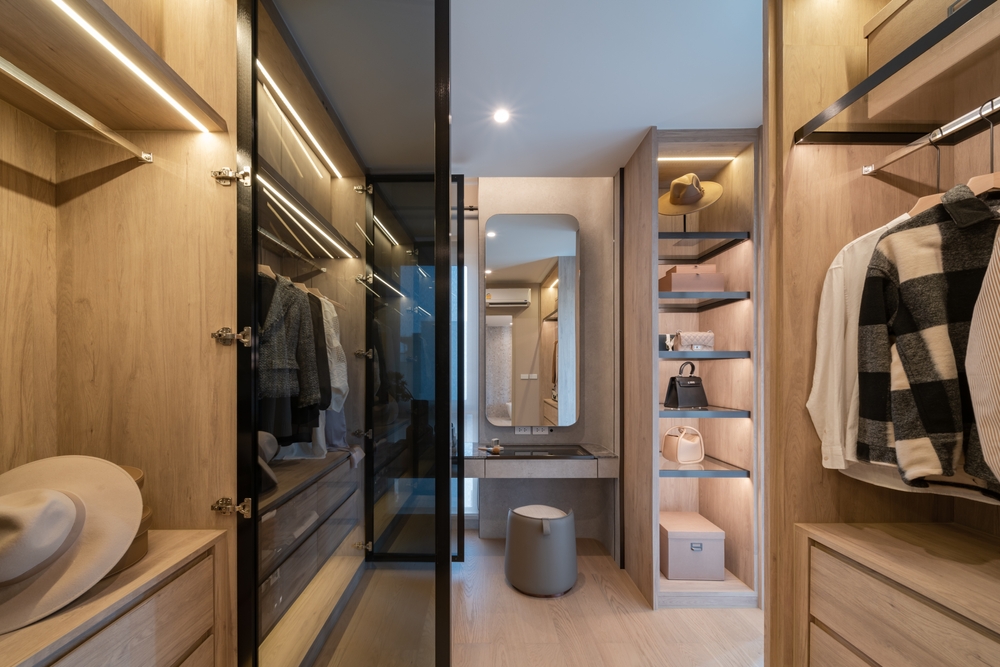
Your wardrobe should work with your routine, not against it. By mapping out zones based on how you get dressed each day, every shelf and rail becomes an intuitive part of your morning ritual. Remember that a well-thought-out wardrobe layout can transform your daily routine and streamline your dressing process. Here’s how you can achieve that:
Assess your lifestyle before diving into the specifics of wardrobe organisation. Do you work in a corporate environment, or is your job more casual? How often do you attend formal events? Understanding these aspects will help you prioritise and allocate space according to your unique clothing requirements.
If your weekdays are dominated by office attire, allocate a significant portion of your wardrobe to workwear. Group your clothing by type - blazers, trousers, shirts, and skirts. Consider using hangers for items that crease easily, like blazers and trousers, and folding items like sweaters and shirts that can be stacked neatly on shelves.
For those who value comfort, designate a space for casual clothing. This section should be easily accessible, as these items are frequently worn. Include shelves or drawers for T-shirts, jeans, and activewear. Use hooks or cubbies for accessories such as hats or scarves to keep everything effortless and organised.
Evening wear, such as cocktail dresses and suits, deserves a dedicated section in your wardrobe. These items are typically worn less frequently but require special attention due to their delicate fabrics. Use padded hangers to maintain the shape of dresses and suits, and consider garment bags for added protection.
Place the clothing you wear most often at eye level. This simple strategy can save you time and effort, ensuring that your go-to pieces are always within reach. For example, if work shirts and trousers are your daily staples, position them centrally in your wardrobe.
To maintain a clutter-free wardrobe, rotate seasonal items. Store off-season clothing in upper or lower sections of your wardrobe, or in storage bins, to free up space for current-season attire. This will help keep your wardrobe streamlined and focused on your immediate needs.
Maximise your wardrobe's storage potential by utilising vertical space. Install double-hanging rods to multiply the hanging area, and add adjustable shelves to accommodate different-sized items. This ensures that no space is wasted, and everything has its designated spot.
Think of your walk in wardrobe as both a display and a hiding place. An open and closed storage combination not only showcases your key wardrobe highlights but also tucks away the “extras,” so your space always feels clean, curated, and uniquely yours. Here’s how you can effectively incorporate both storage types into your walk in wardrobe.
Open shelves are a staple in modern wardrobe design, offering versatile storage options that cater to a variety of needs. They are ideal for items that benefit from visibility and easy access, such as handbags, hats, and folded garments. To keep open shelves organised, consider using decorative boxes or baskets that complement your wardrobe's colour scheme, allowing for a tidy yet accessible display.
Clothing rails provide the perfect solution for hanging frequently used items, such as blouses, coats, and trousers. By keeping these essentials at eye level, you can quickly locate and select your outfit for the day. To maintain order, arrange your clothes by category or colour, which enhances the visual appeal and simplifies your morning routine.
Open storage is also ideal for showcasing accessories like sunglasses and scarves. Use tiered trays or small organisers to keep these items neatly arranged and easy to find. This adds an element of personal style to your wardrobe and encourages you to make use of your entire accessory collection.
Drawers play a role in reducing visual clutter by concealing personal items that may not be visually appealing when left out in the open. Opt for deep drawers to store seasonal clothing, undergarments, or workout gear. Drawer dividers can further enhance organisation by keeping smaller items, such as socks or ties, neatly separated and easy to locate.
Closed cabinets are perfect for storing bulkier items that you don’t need daily, such as luggage, bulky sweaters, or bed linens. By keeping these items behind closed doors, you maintain a clean and streamlined look within your wardrobe. For added convenience, consider installing cabinets with adjustable shelving to accommodate items of varying sizes.
Security and discretion are paramount when it comes to valuable possessions. Incorporating hidden compartments within your closed storage can offer peace of mind. These discreet spaces can be used to store important documents or other valuables, ensuring they are safe and out of sight.
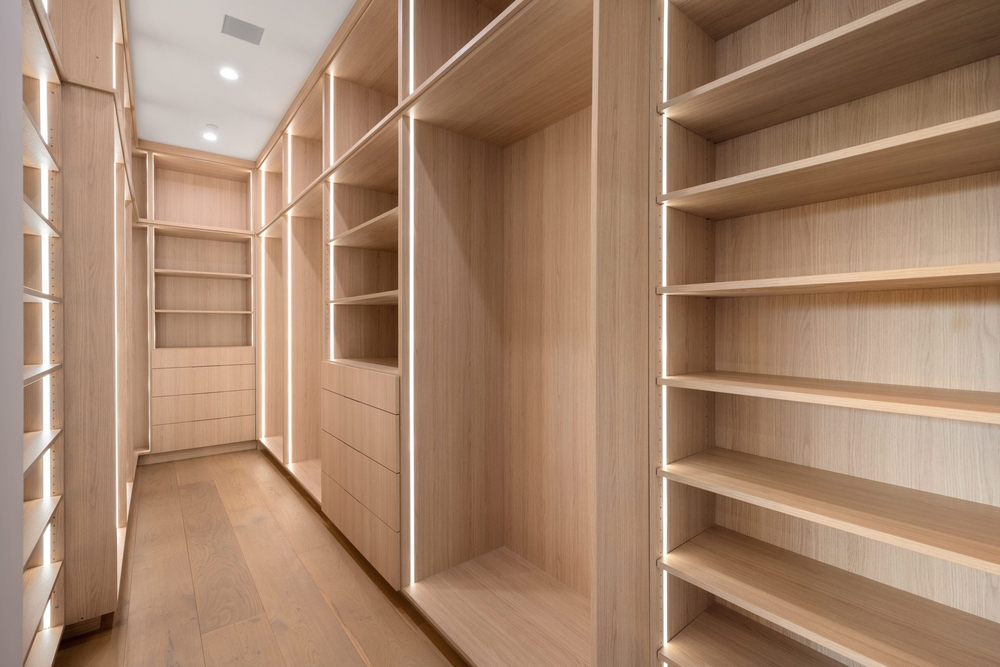
When designing a walk in wardrobe, make the most of your available space, and that means looking up! Vertical space is often underutilised, but with a few strategic design choices, it can become a game-changer for wardrobe organisation. Here's how to make the most of it:
One of the most effective ways to capitalise on vertical space is by extending shelving or cubbies to the ceiling. This is perfect for storing seasonal or lesser-used items that don't require daily access. Consider using clear or labelled storage containers to keep these items visible and easily identifiable. By doing so, you free up more accessible areas for everyday essentials and maintain a tidy and clutter-free appearance.
Flexibility is key in a well-designed walk in wardrobe. Adjustable shelving systems allow you to adapt to your changing wardrobe needs over time, ensuring your space remains as efficient and functional as possible.
Creating a walk in wardrobe that remains organised and functional involves more than just hanging clothes. Shoes and accessories, often the culprits of clutter, require their own designated spaces. By designing dedicated zones for these items, you ensure that everything has a place, promoting orderliness and efficiency. You can achieve all these through these ideas:
Shoes are one of the most frequently accessed items in a wardrobe, yet they often end up scattered across the floor. Implementing effective shoe storage solutions can transform chaos into serenity.
Accessories, though small, can quickly contribute to clutter if not properly organised. When given their own zones, they not only enhance the visual appeal of your wardrobe but also streamline your daily routine.
The placement of accessory zones is crucial for maintaining a streamlined routine.
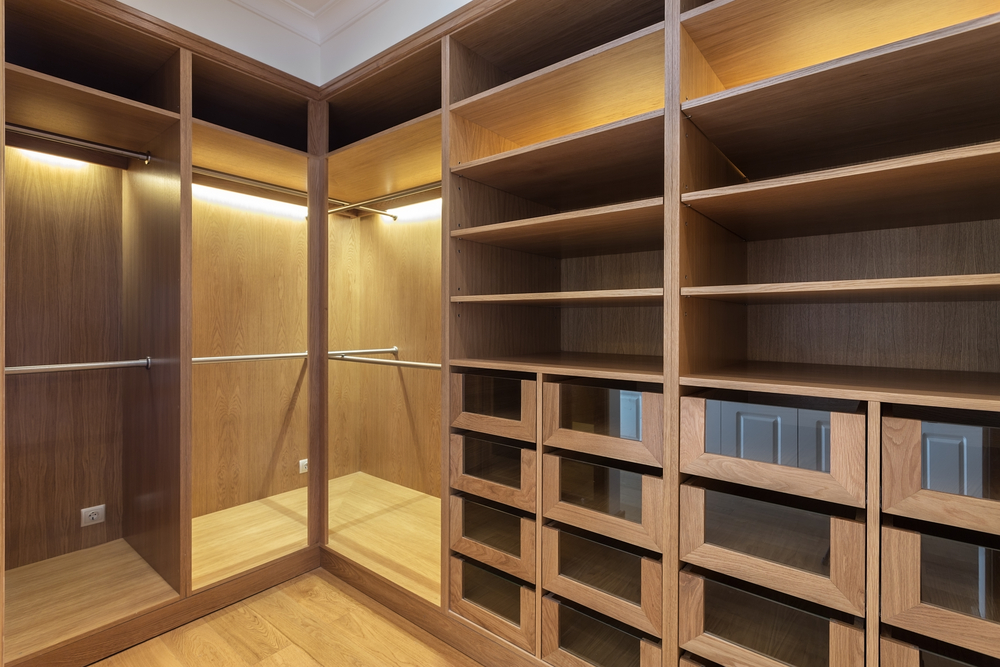
Lighting has a role in an organised walk in wardrobe. It is not merely about aesthetics; the right lighting ensures functionality, helping you with order and efficiency. A well-lit wardrobe reduces clutter and allows you to see the full spectrum of your clothing and accessories, enabling better decision-making for your daily outfits. Without adequate lighting, even the most meticulously arranged space can become chaotic, as items are easily overlooked or misplaced.
An effective lighting solution for a walk in wardrobe is LED strip lighting. These lights are versatile, energy-efficient, and provide a clean, bright light that mimics daylight, making it easier to distinguish between similar colours and fabrics. By installing LED strips along the edges of shelves or underneath hanging rods, you can ensure that even the deepest corners of your wardrobe are illuminated.
LED strip lighting is advantageous because it can be customised to fit any design or size requirement. Whether your wardrobe is expansive or compact, these lights can be tailored to suit your specific needs, ensuring every inch of your storage space is well-lit. Additionally, LED lights have a long lifespan and consume less energy than traditional lighting, making them a cost-effective choice for long-term use.
Incorporating motion sensors into your wardrobe lighting system can elevate its functionality to a new level. Motion sensor lights automatically illuminate the space the moment you walk in, eliminating the need to fumble for switches in the dark. This adds convenience and contributes to maintaining a sorted space. By ensuring that lights are only on when needed, you can also save energy and extend the lifespan of your lighting fixtures.
Moreover, motion sensors can be placed to activate specific sections of your wardrobe as you move around, ensuring that you always have the light you need exactly where you need it. Targeted lighting reduces overlooking items, helping you keep track of your wardrobe contents more effectively.
When designing the lighting for your walk in wardrobe, you must consider the overall lighting scheme to create a harmonious and comfortable environment. Balance is key. While bright, direct lighting is necessary for functionality, softer ambient lighting can add warmth and relaxation to the space. Consider combining LED strip lighting and motion sensors with recessed ceiling lights or pendant lights to achieve this balance.
Dimmers can also be an excellent addition, allowing you to adjust the light intensity based on your needs. Whether you're getting ready for an evening out or simply organising your clothes, having control over the lighting levels can enhance your experience and ensure that your walk in wardrobe remains practical and inviting.
Creating an organised walk in wardrobe requires meticulous attention to detail, especially when it comes to storing small items. Shallow drawers are an essential component in maintaining order and preventing items from being buried and forgotten. Their design not only maximises space but also ensures that every item is easily accessible.
Shallow drawers provide the ideal environment to neatly store underwear and lingerie. By avoiding deep piles, you can ensure that each piece of clothing maintains its shape and remains wrinkle-free. Consider using soft, fabric-lined dividers that can be adjusted to fit different items, keeping everything in its place.
Jewellery is another category that benefits immensely from shallow storage solutions. Custom inserts with felt or velvet lining can be used to protect delicate pieces while allowing for clear visibility. These inserts can be compartmentalised to hold rings, necklaces, bracelets, and earrings separately, preventing tangling and damage.
Shallow drawers are ideal for storing folded T-shirts as they encourage a single-layer approach. This method saves time when selecting an outfit and maintains the integrity of the fabric. T-shirts are less likely to develop creases when they are not piled on top of each other.
Drawer dividers come in various materials and sizes, allowing you to customise each drawer according to its contents. Adjustable dividers can be particularly useful as your needs change over time, providing flexibility in your wardrobe organisation.
By categorising items within each drawer, dividers prevent items from shifting and mixing, thus maintaining order. Whether it’s separating socks from undergarments or keeping different types of jewellery apart, dividers ensure that everything has its designated place.
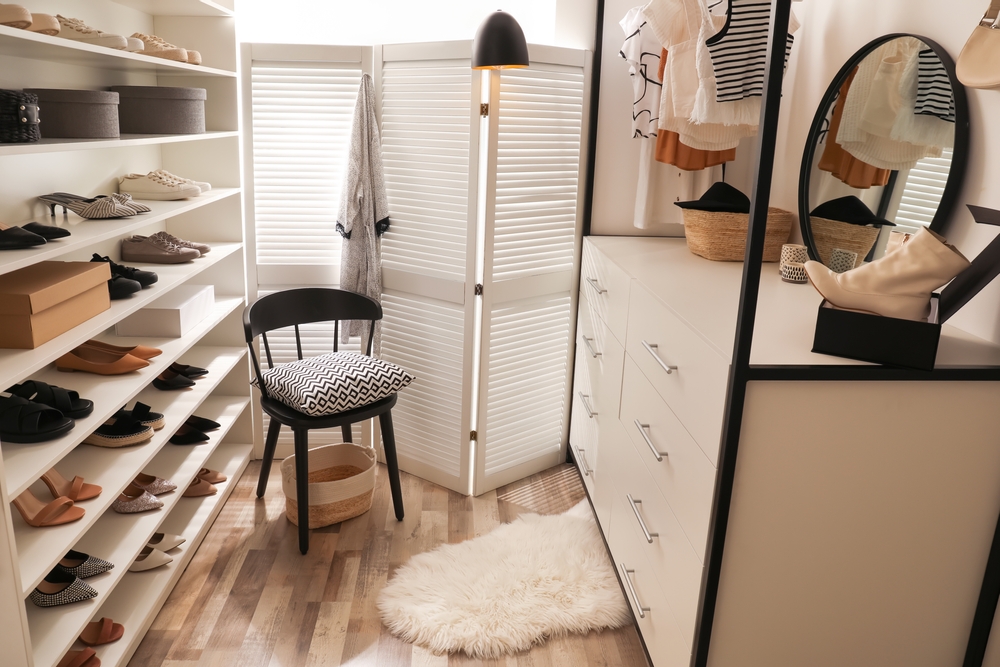
When designing a walk in wardrobe, one of the most common pitfalls is failing to anticipate future needs. A wardrobe that initially appears spacious can quickly become cramped and disorganised if it lacks room for growth. By planning for future additions, you ensure your wardrobe remains functional and aesthetically pleasing over time.
As your personal style evolves and your clothing collection expands, your wardrobe needs to accommodate these changes effortlessly. Consider the types of items you frequently purchase and how they might impact your storage needs. For instance, if you’re inclined to buy more shoes, ensure there's adequate shelving or dedicated shoe racks. If accessories like hats or bags are your passion, incorporate hooks or cubbyholes to keep them organised.
An overstuffed wardrobe looks cluttered and damages your clothes and accessories. When items are crammed together, they are more prone to wrinkles, tears, and scuffs. To avoid this, create extra space from the start. Aim to leave one shelf and one hanging rod 20% empty. This breathing room prevents overcrowding and allows for easy access to all your items.
Consider incorporating multi-functional furniture, such as an ottoman with storage or a bench with drawers. These pieces can store out-of-season clothing or lesser-used items, freeing up your main wardrobe space for growth. Multi-functional furniture expands space and adds an element of style and sophistication to your walk in wardrobe.
A full-length mirror does more than help you check your outfit; it transforms your entire dressing space. Mounted on the back of a door or flush against a wall, a well-placed mirror reflects natural light, making even a cosy apartment feel brighter and roomier. Here’s why a full-length mirror is a must-have for your walk in wardrobe.
A full-length mirror allows you to see your entire outfit at once, speeding up your morning routine. With a quick glance, you can assess your ensemble from head to toe, ensuring that everything is perfectly coordinated. No more running back and forth between a small mirror and your wardrobe because everything you need is right there, making the process of getting ready more efficient.
Having a full-length view helps prevent common outfit mishaps, such as mismatched shoes or accessories. This comprehensive view ensures that every detail of your outfit is in harmony, boosting your confidence as you step out for the day. This attention to detail benefits busy professionals who need to look polished and put-together without spending extra time on outfit checks.
A full-length mirror encourages you to make outfit decisions inside the wardrobe space, reducing the temptation to leave clothes strewn around your bedroom. By creating a designated area for dressing and outfit evaluation, you minimise clutter and maintain a tidy living space. This is useful in smaller homes or apartments where space is at a premium.
With a full-length mirror, you are more likely to make thoughtful choices about what you wear. Rather than hastily picking out clothes and discarding unwanted items onto the nearest chair or bed, you can take your time to consider your options, trying on different combinations while keeping everything neatly within the wardrobe area.
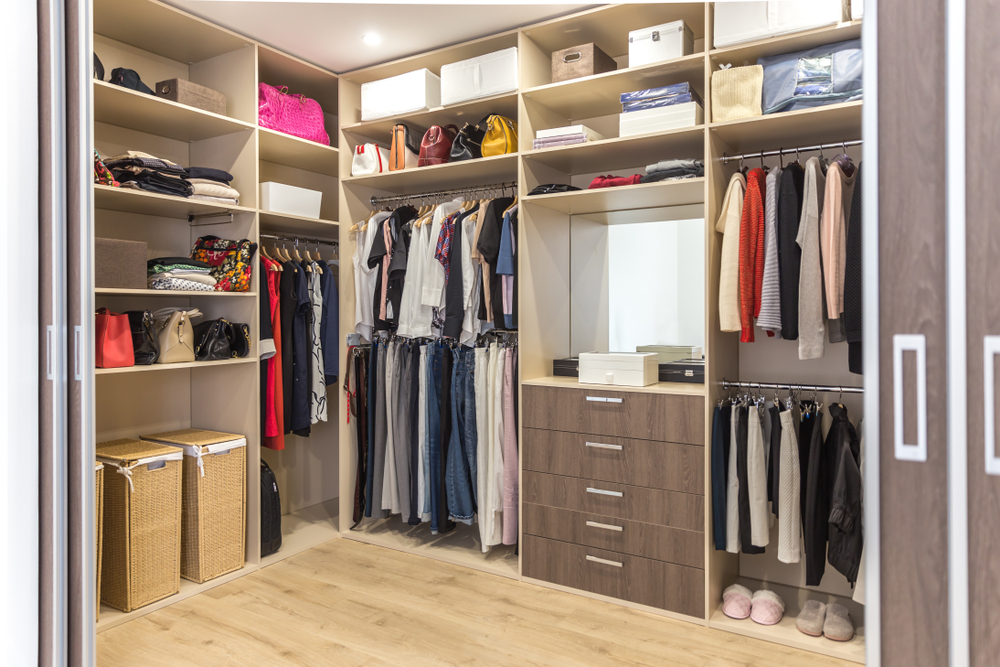
Don’t let dirty laundry derail your décor, so add a well-chosen hamper inside your wardrobe. One often overlooked aspect is managing dirty laundry. By incorporating a hamper or dirty clothes bin inside your walk in wardrobe, you can maintain a tidy and orderly space, ensuring that clothes don't end up strewn across the floor or draped over chairs. Here’s how to make this simple addition a game-changer for your wardrobe organisation.
Having a designated spot for dirty clothes within your walk in wardrobe is important for several reasons:
Selecting the perfect hamper or bin involves more than just picking the first option you see. Consider the following factors to ensure it fits seamlessly into your wardrobe:
Where you place the hamper or bin within your walk in wardrobe can impact its effectiveness:
Incorporating a hamper or dirty clothes bin is just one part of maintaining an arranged walk in wardrobe. Here are a few additional tips:
With these nine practical design tips in your toolkit, you’re well on your way to transforming your walk in wardrobe into a streamlined sanctuary that reflects your personal style and simplifies your daily routine. From tailoring your layout to your dressing habits and balancing open display with hidden storage to maximising vertical real estate and adding a full-length mirror for that flawless head-to-toe check, each element works together to keep clutter at bay and make outfit choices effortless. Ready to bring your dream wardrobe to life? Reach out to Silva Wardrobe today for a bespoke design consultation, and step into a more organised, elegant tomorrow.
Here at Silva Wardrobes, we believe that you shouldn't have to compromise on quality when you’re on a budget. We offer a wide range of built in wardrobe designs in varying materials and finishes, so you can get the perfect built in or walk in wardrobe for your home no matter what the budget you're working with.
Proudly Australian owned and made. All our work is carried out locally in Sydney with only the highest level of craftsmanship and comes with a lifetime guarantee.